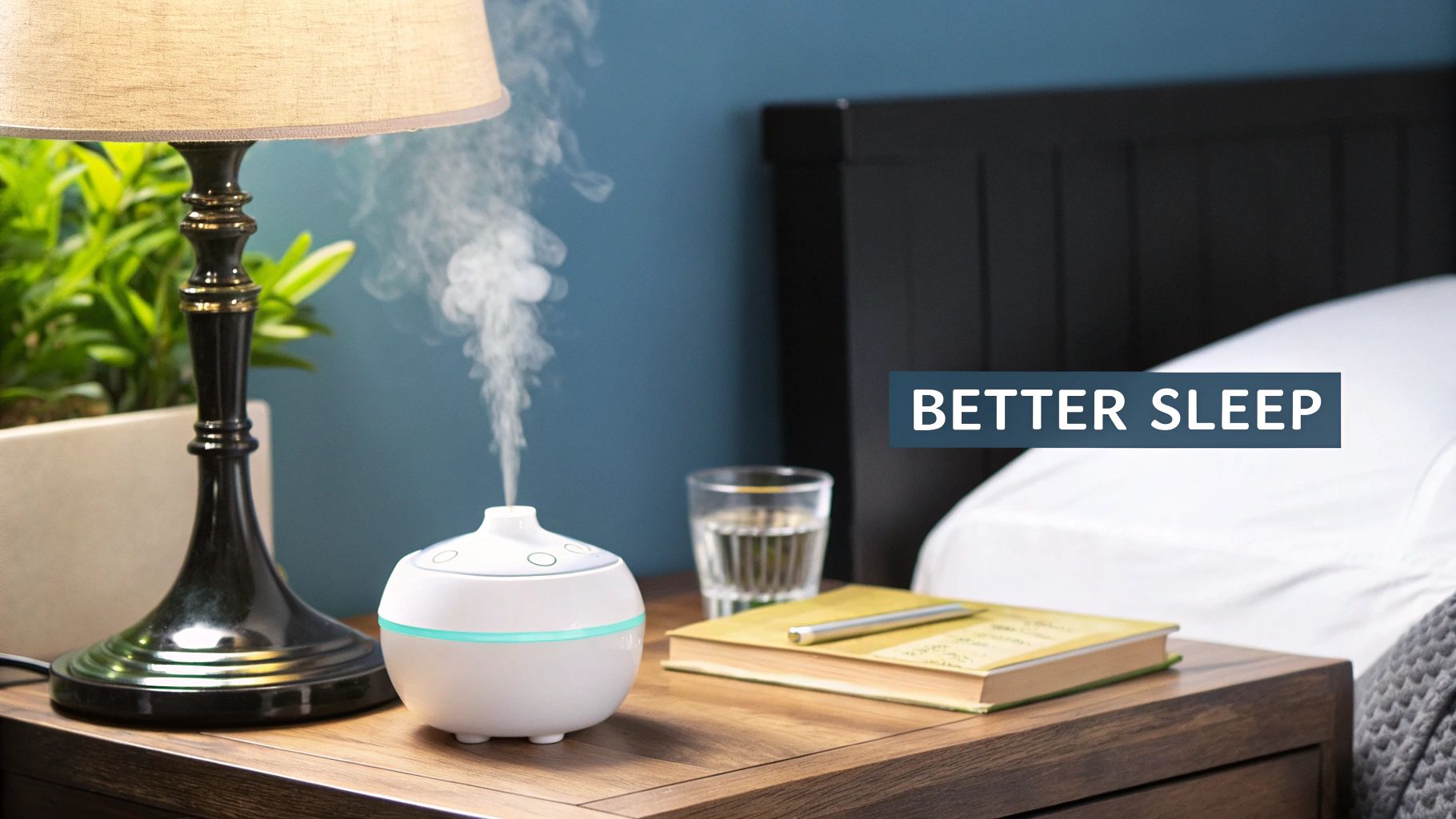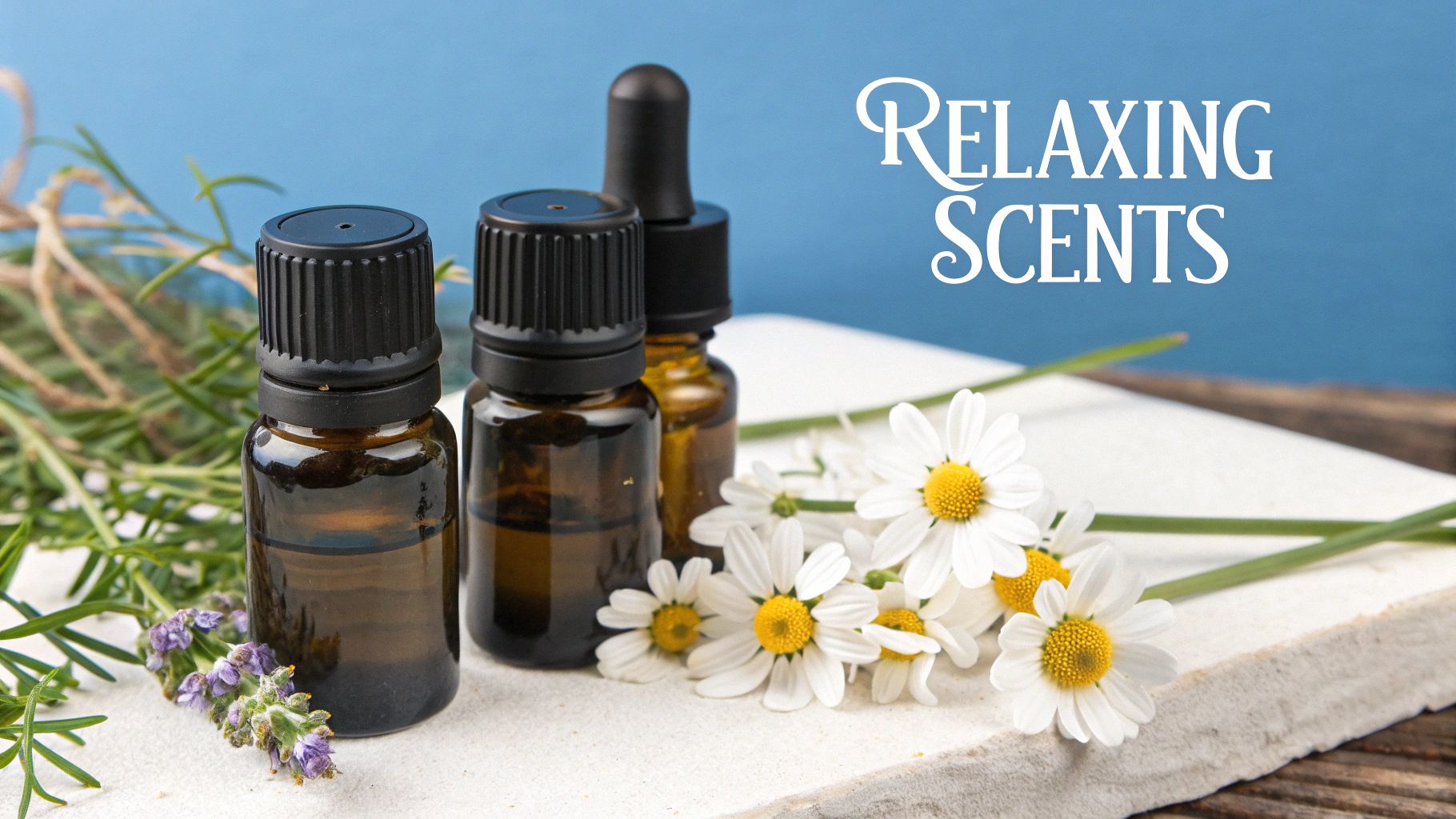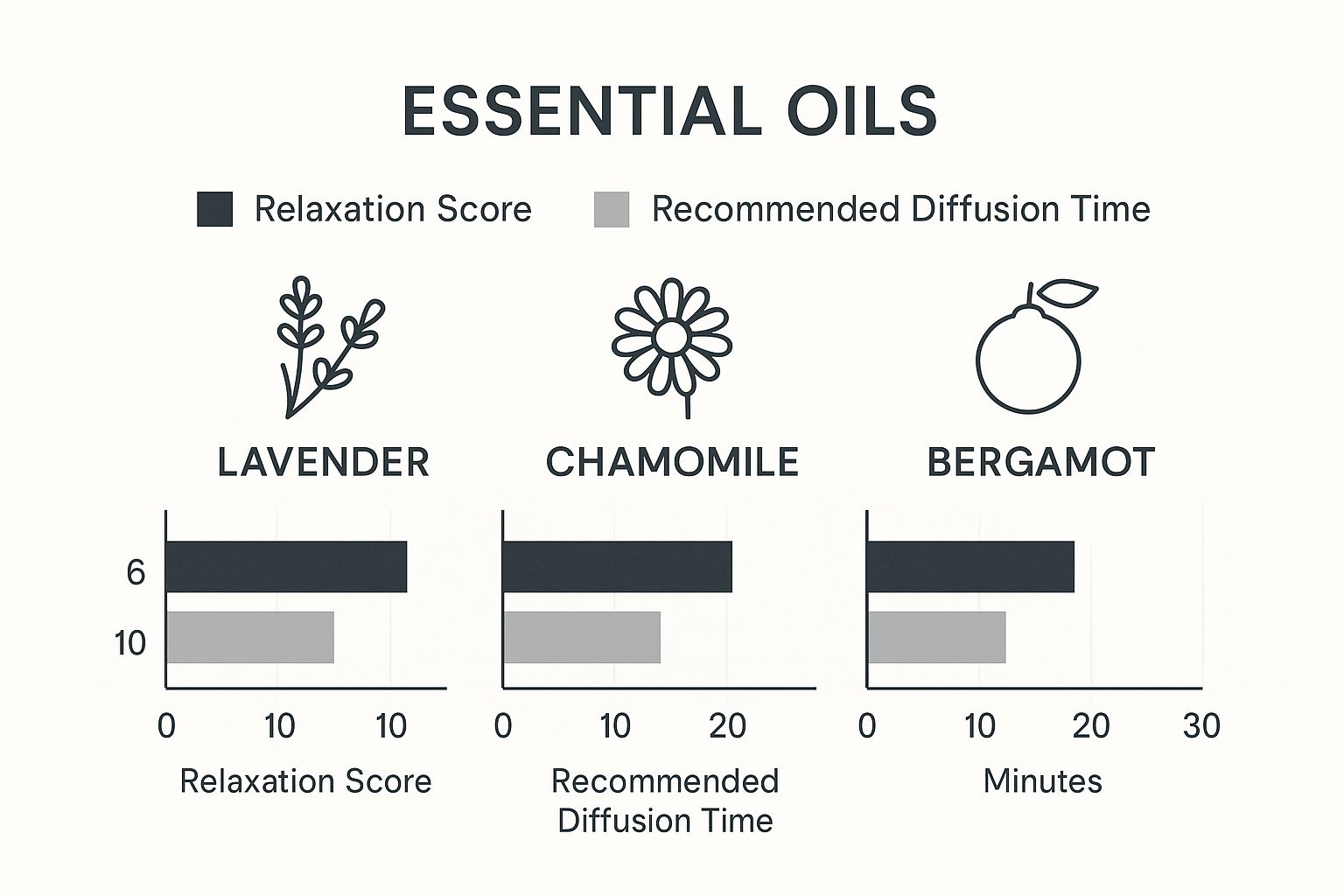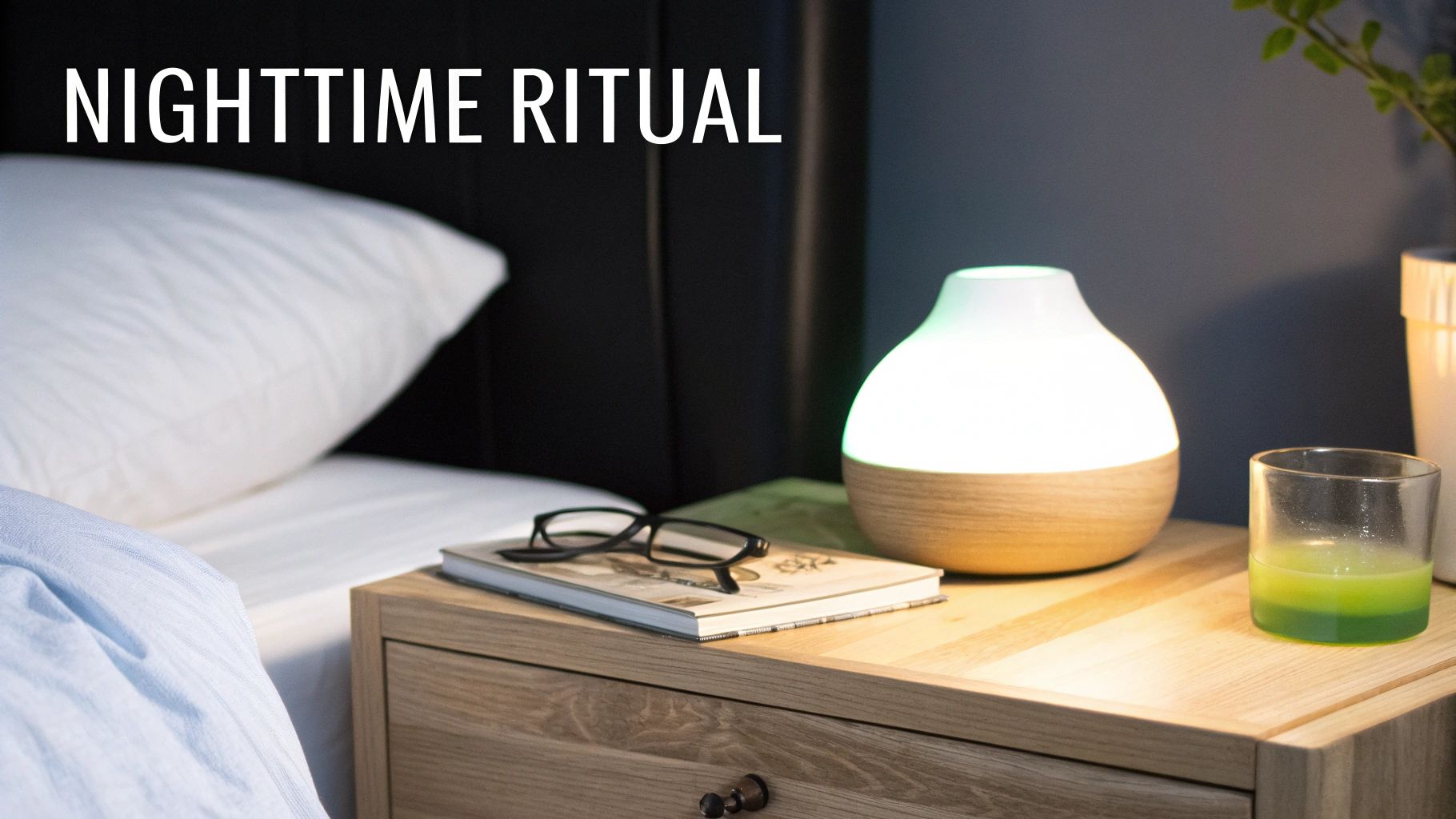Find Your Best Essential Oil Diffuser for Sleep
Aug 13, 2025
If you're sick of tossing and turning every night, an essential oil diffuser for sleep might be the simple, effective answer you've been looking for. It’s a gentle, natural way to shift your nightly routine, using calming scents like lavender to signal to your brain that it’s time to unwind. This creates a deeply tranquil bedroom environment that encourages restorative rest, often from the very first use.
Your Guide to Deeper Sleep Starts Tonight

The nightly struggle for a good night's sleep is a story many of us know all too well. All that tossing, turning, and clock-watching can become an incredibly frustrating cycle, leaving you feeling drained before the day has even started. If this sounds like your reality, you're definitely not alone in searching for a gentler, more natural path to finding peace at bedtime.
This is exactly where the ancient practice of aromatherapy, given a modern twist with an essential oil diffuser for sleep, can make a real difference. It’s not about overhauling your life or adopting complicated new habits. It's about making one simple yet powerful change to your environment that helps prepare your body and mind for rest.
Setting the Stage for Serenity
Picture your bedroom transforming into your own personal sanctuary of calm. That's what a diffuser does. It works by dispersing a fine, cool mist of water and essential oils into the air. As you breathe in these aromatic molecules, they travel directly to your brain's limbic system—the part that handles emotions, memory, and relaxation.
This isn't just a pleasant experience; it can trigger a real, physical response in your body:
- Lowering Stress Hormones: Soothing scents can help bring down your levels of cortisol, the body's main stress hormone.
- Slowing Your Heart Rate: Certain aromas, especially lavender, are known to have a mild sedative effect that helps gently slow your heart rate.
- Easing Mental Chatter: The fragrance gives your mind a pleasant focal point, helping to quiet the racing thoughts that so often keep us awake.
Think of it as creating a "sleep signal" for your brain. Just like dimming the lights tells your body it's time to wind down, a calming scent can become a powerful cue that signals the transition from a busy day to a night of deep, restorative sleep.
A Growing Movement Toward Natural Rest
This simple wellness practice is getting a lot of well-deserved attention. As more people look for natural ways to improve their sleep, the demand for these tools is soaring. In fact, the global market for essential oils for sleep is currently valued at around $2.5 billion and is expected to grow significantly. This trend really highlights a collective shift towards more holistic solutions for managing the stress of our busy lives. You can check out more insights on this growing market over at DataM Intelligence.
Forget any idea that you need some elaborate, complicated setup. A quality essential oil diffuser is a simple, elegant addition to your bedside table. Throughout this guide, we'll walk you through everything you need to know—from picking the right device and oils to building a nightly ritual that actually works for you. Let’s get you started on your journey to waking up refreshed and revitalized.
How Scent Signals Your Brain to Rest

Have you ever caught a whiff of a familiar smell and felt instantly transported back in time? Maybe the scent of baking cookies reminds you of your grandmother's kitchen, or freshly cut grass takes you straight to a summer afternoon. That powerful link isn't just in your head; it’s a direct line to how your brain is wired.
This very same biological pathway is what makes an essential oil diffuser for sleep such an incredible tool for unwinding. Think of your nose as an express lane to your brain's emotional control center.
When you breathe in the aroma from a diffuser, tiny molecules from the essential oils travel up to your olfactory nerves. These nerves have a special, direct connection to the limbic system—the primal part of your brain that handles emotions, memories, and instinct.
What’s fascinating is that smell bypasses the brain's usual sorting station (the thalamus) that all your other senses have to go through. It goes straight to the core, which is why a scent can trigger a feeling almost instantly, long before your conscious mind can even name it.
Unlocking Your Brain's Relaxation Response
Imagine your brain’s relaxation center is behind a locked door. The right essential oil is the key. When you diffuse a calming oil like lavender or chamomile, their aromatic molecules click into place with receptors in your brain, effectively unlocking that door.
This simple action kicks off a whole cascade of physical changes that get your body ready for sleep. It’s more than just a vague feeling of calm; it produces real, tangible effects. For example, specific compounds in sleep-promoting oils, like linalool in lavender, have been shown to interact with neurotransmitters that help quiet the entire nervous system.
Once your limbic system gets these calming scent signals, it starts sending messages throughout your body to slow everything down. This can help lower your heart rate, reduce blood pressure, and dial down the production of cortisol—the infamous stress hormone that often keeps you staring at the ceiling at 2 a.m.
This direct, scientific mechanism is the secret behind the deep tranquility aromatherapy can bring, making it so much easier to shift from the busy alertness of your day to the deep rest your body craves.
Why Modern Diffusers Preserve These Benefits
To get the full therapeutic punch, the delicate chemical compounds in the essential oils have to stay intact. This is where the technology of a modern essential oil diffuser for sleep really shines. Old-school methods often used heat, which can actually degrade the fragile structure of the oils and weaken their benefits.
Today’s best diffusers, especially ultrasonic models, take a completely different approach.
- Heat-Free Operation: They use high-frequency vibrations to break down water and essential oils into a fine, cool mist. This clever process preserves the oil's complete chemical profile.
- Gentle Dispersion: The cool mist is light and easy to breathe in, allowing those aromatic molecules to travel efficiently to your brain without any harshness.
- Controlled Output: Modern diffusers often come with timers and intensity settings, letting you create the perfect ambient aroma for your wind-down routine without it being overwhelming.
By choosing a heat-free method, you're making sure the "key" you're using to unlock your brain's relaxation response is in perfect shape. This focus on preservation is a core part of the many benefits of an essential oil diffuser for both sleep and overall well-being. You’re not just making your room smell nice; you’re actively supporting your body's natural sleep cycle.
Choosing the Right Diffuser for Your Bedroom
Picking out an essential oil diffuser for sleep is about more than just finding one that looks good on your nightstand. The right device can be a silent partner in your quest for better rest, but the wrong one can easily do more harm than good. To make a smart choice, you need to understand the different types of diffusers out there and which features really matter in the quiet sanctuary of a bedroom.
It's no secret that these devices are becoming a wellness staple. The aromatherapy diffuser market, valued at a staggering USD 1.83 billion, is expected to soar past USD 3.35 billion by 2032. This boom shows just how many of us are turning to these simple tools to dial down stress and finally get a good night's sleep.
Comparing Diffuser Types for Bedroom Use
Not all diffusers are created equal, especially when your goal is drifting off to sleep. The technology used to disperse the essential oils directly impacts the noise level, the amount of mist, and how effective the whole process is for relaxation.
While you'll find a few different kinds on the market, one type consistently comes out on top for bedroom use: ultrasonic diffusers. These are widely seen as the gold standard for good reason. They work by using silent, high-frequency vibrations to break down a mixture of water and essential oils into a fine, cool mist. This heat-free method is a big deal because it keeps the delicate therapeutic properties of the oils intact, making sure you get all of their calming benefits.
Here’s a quick rundown of why ultrasonic models are so perfect for a nightly wind-down ritual:
- Whisper-Quiet Operation: They’re practically silent. Most only produce a soft, gentle hum that can even double as a bit of soothing white noise.
- Dual Functionality: Because they use water, they also act as small-scale humidifiers. This adds a little moisture to the air, which can make breathing much more comfortable, especially in dry climates or during the winter.
- Gentle Aroma Dispersion: They release a subtle, steady mist that won't blast you with fragrance or overwhelm your senses when you're trying to relax.
This chart breaks down some of the most popular essential oils for sleep, giving you a starting point with their relaxation strength and ideal diffusion times.

As you can see, an oil like lavender is incredibly relaxing, but it's best diffused for a moderate amount of time to avoid getting used to the scent. Meanwhile, chamomile can be used for shorter, more potent sessions.
To help you visualize the options, here’s a quick comparison of the four main types of diffusers.
Comparing Diffuser Types for Bedroom Use
| Diffuser Type | How It Works | Best For | Potential Downsides |
|---|---|---|---|
| Ultrasonic | Uses electronic frequencies to vibrate water and oil into a cool mist. | Bedrooms, quiet spaces, and adding gentle humidity. | Requires regular cleaning to prevent mold; uses water. |
| Nebulizing | Uses pressurized air to break down pure essential oil into fine particles. | Strong, therapeutic aroma concentration in a large space. | Can be noisy; uses oils very quickly; more expensive. |
| Evaporative | A small fan blows air through a pad or filter soaked with essential oil. | Quick and simple scenting for smaller, less-critical areas. | Weaker aroma; fan can be noisy; less therapeutic benefit. |
| Heat | Gently warms the essential oil to help it evaporate into the air. | Simple, silent operation for very subtle scenting. | Heat can alter the oil's chemical properties and reduce benefits. |
For nighttime use, the choice is pretty clear. Ultrasonic models offer the best combination of quiet operation, gentle mist, and therapeutic effectiveness, making them the superior partner for your sleep routine.
Your Sleep-Friendly Diffuser Checklist
Beyond just picking the right type, a few specific features are non-negotiable for an uninterrupted night. When you’re shopping for an essential oil diffuser for sleep, keep this checklist handy to make sure your new device will support your rest, not sabotage it.
Think of these features as the "Do Not Disturb" settings for your aromatherapy. They’re designed to create a perfectly passive and serene environment, letting the diffuser work its magic without you having to lift a finger once you're settled in.
1. Adjustable Timer with Auto Shut-Off
This is probably the most critical feature of all. You really don't need a diffuser running the entire night. A good model will offer multiple timer settings—like 1, 3, or 6 hours—so it can turn itself off automatically. This not only saves your precious oils but also adds a layer of safety once you’ve drifted off.
2. No-Light or Lights-Off Mode
Lots of diffusers come with colorful LED lights. While they can be nice during the day, they're a real problem at night. Even a tiny bit of light can mess with your body's melatonin production and disrupt sleep. Always look for a model that lets you turn the light completely off while it continues to mist.
3. Quiet Operation
Look for diffusers specifically marketed as "quiet" or "whisper-quiet," with a noise level under 30 decibels. That’s quieter than a soft whisper and will just blend into the background noise of your room. If you want to get into the nitty-gritty of how these quiet machines work, check out our guide on how an oil diffuser works.
4. Appropriate Capacity and Run Time
Think about the size of your bedroom. A smaller room will do great with a 100-200ml water tank, which usually runs for about 3-6 hours. If you have a larger master suite, you might want to look for a 300-500ml model. The idea is to match the run time to your wind-down period, not have it chugging along until your alarm goes off.
By focusing on these key features, you’ll find a device that perfectly complements your journey to deeper, more restorative sleep.
The Best Essential Oils for Restful Sleep

Alright, you’ve picked out the perfect diffuser. Now for the fun part—choosing the magic ingredients. An essential oil diffuser for sleep is a fantastic tool, but its real power comes from the oils you put inside it. Think of it as creating a personal scent menu for serenity.
Each oil offers a unique pathway to a calmer mind and a more peaceful night. The right scent does more than just make your room smell amazing; it actually triggers a physiological response that helps your whole body unwind. This is why it’s so important to pick oils that are known for their deeply calming properties.
The Stars of the Night
While plenty of aromas smell wonderful, a few stand out as true champions of sleep. These oils are packed with specific natural compounds that interact with your nervous system, signaling that it’s time to relax and paving the way for deep, restorative rest.
1. Lavender (Lavandula angustifolia)
This one is the undisputed king of sleep scents. Lavender is celebrated for its incredible ability to soothe the mind, thanks to a compound called linalool. Linalool has a mild sedative effect that can help quiet a racing brain. In fact, studies have shown it can even increase the amount of time you spend in the deeper, more restorative stages of sleep.
- Scent Profile: Soft, floral, and slightly herbaceous. It’s that classic, comforting aroma everyone knows and loves.
2. Roman Chamomile (Chamaelum nobile)
Imagine a warm, comforting cup of herbal tea, but for your senses—that’s Roman Chamomile. It’s phenomenal for easing tension and irritability, making it your best friend on nights when you feel mentally and emotionally frazzled.
- Scent Profile: Sweet and fruity, almost like apples, with a gentle floral note. It’s an incredibly peaceful and comforting scent.
3. Bergamot (Citrus bergamia)
I know what you're thinking—a citrus oil for sleep? But Bergamot is the exception to the rule. While it has an uplifting quality that can ease feelings of sadness or anxiety, it also has powerful calming properties that can actually lower your heart rate and blood pressure, getting your body perfectly prepped for sleep.
- Scent Profile: A complex and sophisticated citrus that’s both bright and floral, with a hint of spice. It's the unique aroma that gives Earl Grey tea its signature flavor.
A quick but critical note on quality: The purity of your essential oils matters. A lot. Always choose 100% pure, therapeutic-grade oils from brands you trust. Cheaper fragrance oils are just synthetic chemicals. They have zero therapeutic benefits and can even give you a headache, which completely defeats the purpose of using an essential oil diffuser for sleep.
Expert-Crafted Sleep Synergy Blends
While single oils work beautifully on their own, blending them can create a synergistic effect where the whole is even greater than the sum of its parts. Here are a couple of my favorite recipes to try. Just add the drops to 100ml of water in your diffuser.
Quiet Mind Blend
Perfect for those nights when your thoughts are racing and you just can't seem to switch off.
- 4 drops Lavender
- 3 drops Roman Chamomile
- 1 drop Sandalwood
Drift to Sleep Formula
A deeply grounding blend that helps melt away physical and mental tension, encouraging a smooth transition into dreamland.
- 3 drops Bergamot
- 3 drops Lavender
- 2 drops Vetiver
Oils to Avoid Before Bed
Just as some oils help you drift off, others do the exact opposite. You'll want to steer clear of anything too stimulating that might increase alertness and make it harder to fall asleep.
- Energizing Citrus: Bergamot is the outlier, but other citrus oils like Lemon, Grapefruit, and Sweet Orange are generally energizing. Save them for your morning routine.
- Invigorating Mints: Peppermint and Spearmint are fantastic for boosting focus, but that's not what you want at 10 PM.
- Stimulating Herbs: Rosemary, Eucalyptus, and Tea Tree are great for clearing your head or your sinuses, but they're far too stimulating for a pre-sleep ritual.
By choosing your aromas with intention, you create an environment that tells your body and mind, "Hey, it's time to rest." Part of the joy is experimenting with different scents and blends. If you're looking for more inspiration, you can explore a wide range of essential oils for home scent to find the perfect atmosphere for any mood. Nailing your nightly ritual will make all the difference in getting the deep, tranquil sleep you deserve.
Here is the rewritten section, designed to sound like an experienced human expert and match the provided examples.
Your Nightly Wind-Down Ritual Starts Here
Think of your essential oil diffuser not just as a gadget that makes your room smell nice, but as the cornerstone of a powerful nightly ritual. When you create a consistent wind-down routine, you're sending a clear signal to your brain: the day is done, and it’s time to prepare for rest. Weaving aromatherapy into this routine is what turns a simple habit into something truly transformative for your sleep.
The real secret sauce is consistency and timing. It's like setting a gentle alarm clock, but for falling asleep instead of waking up. By firing up your diffuser at the same time every evening, you create a potent psychological cue that tells your body and mind to start shifting gears.
Setting Up Your Sleep Sanctuary
I’ve found the sweet spot for timing is about 30 to 60 minutes before you actually plan to turn off the lights. This gives the aroma enough time to gently permeate the space, creating a tranquil atmosphere that’s waiting for you as you get ready for bed. You're not aiming for an overwhelming cloud of fragrance—the goal is a subtle, calming backdrop.
To get it just right, here's what I recommend:
- The Golden Ratio: Stick with the rule of 3-5 drops of essential oil for every 100ml of water. A smaller bedroom probably only needs 3 drops, while you might lean toward 5 for a larger, more open space. Resist the urge to add more; a gentle scent is far more effective for lulling you to sleep.
- Pick Your Scent: Go back to the calming oils we talked about earlier. You can't go wrong with a classic like lavender, which has been shown time and again to help quiet the nervous system.
- Set It and Forget It: Always use your diffuser's timer. A 1- to 3-hour setting is perfect. This makes sure the diffuser shuts off on its own long after you've drifted off, saving your precious oils and preventing your senses from being overstimulated through the night.
More Than Just Scent: Layering Your Ritual
Your diffuser sets the stage, but the real magic begins when you pair that beautiful aroma with other relaxing activities. This is how you truly cement the connection between the scent and the act of winding down. The aroma becomes the soundtrack to your pre-sleep habits, making everything more potent.
Try weaving one of these into your routine:
- Read a real book (put the phone and tablet away!)
- Do some gentle stretching or yoga to let go of the day's physical tension.
- Jot down your thoughts in a journal to clear your mind.
- Sip a warm, caffeine-free herbal tea, like chamomile.
This approach creates a multi-sensory experience that reinforces your "sleep signal." The calming scent from your essential oil diffuser for sleep, paired with a quiet, screen-free activity, tells every part of you that it’s time to transition into a state of deep, restorative rest.
Keeping It Safe and Performing Perfectly
A little bit of simple care goes a long way in keeping your nightly ritual both safe and effective. Good maintenance ensures your diffuser works flawlessly and that the air you're breathing is as pure as the oils you're using.
First, always ensure proper ventilation by keeping your bedroom door cracked open. This prevents the aroma from becoming too concentrated. Second, routine cleaning is non-negotiable. A quick rinse and wipe-down after every few uses is all it takes to prevent sticky oil residue and mold from building up. For a deeper clean, a little white vinegar swished around once a week will keep the ultrasonic mechanism humming along and ensure every scent is pure and true.
Got Questions About Your Sleep Diffuser? We've Got Answers.
Even when you're excited to start a new routine, a few questions are bound to pop up. To make sure you feel totally comfortable using your new sleep diffuser, we've gathered the most common questions we hear. Think of this as your quick-start guide for all those practical, "am I doing this right?" moments.
Is It Okay to Leave My Diffuser on All Night?
This is probably the #1 question we get. While most modern diffusers have an auto shut-off feature for safety, you really don't need to run it all night. In fact, it's better if you don't.
The real magic happens as you're winding down and just starting to drift off. Leaving it on for hours can lead to something called olfactory fatigue—a fancy term for your nose getting so used to the scent that it just tunes it out. For the best (and safest) results, use a model with a timer and set it for 1 to 4 hours. That's the sweet spot for a truly restful night.
How Many Drops of Oil Should I Actually Use?
It's easy to overdo it when you're first starting out. A good rule of thumb is to begin with 3-5 drops of essential oil for every 100ml of water. This ratio usually creates a lovely, subtle ambiance that's calming without being overwhelming.
Of course, this isn't set in stone. You can always adjust based on your room's size, your personal preference, and how strong the oil is. My advice? Start small. You can always add another drop or two if the scent feels too faint.
Can I Just Use Any Essential Oil for Sleep?
Definitely not! This is a critical point. The oil you choose can either make or break your sleepy-time experience. Some oils, like peppermint, lemon, or rosemary, are known for their stimulating properties. They can actually ramp up your alertness, which is the exact opposite of what you want before bed.
For your nightly wind-down, you'll want to stick exclusively to oils famous for their relaxing and sedating effects. Our top picks are always Lavender, Roman Chamomile, Bergamot, Sandalwood, and Vetiver. Choosing an oil specifically for its calming benefits is the key to making your diffuser work its magic for you.
How Often Do I Need to Clean My Diffuser?
To keep your diffuser running beautifully and hygienically, regular cleaning is non-negotiable. The best habit is to give it a quick rinse and wipe-down with a soft cloth after every use. It only takes a second.
Then, at least once a week, give it a slightly deeper clean. Just add a few drops of plain white vinegar to the water and run a short cycle, then rinse it out completely. This simple step prevents gunky oil buildup, keeps the delicate ultrasonic parts clear, and ensures you get a pure, clean aroma every single time.
Ready to turn your bedroom into the ultimate sleep sanctuary? Dive into the full collection of luxury diffusers and premium fragrance oils from Airomatica and find your perfect match. Build your dream sleep routine today.



